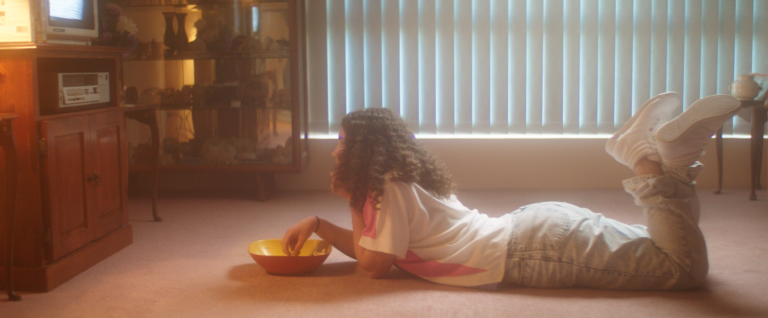Growing up, I used to peruse the aisles of the Canning Bridge Civic Video – a mammoth store with an obnoxious, yet comforting, yellow banner, replete with Groucho Marx and cigar, now turned into an equally mammoth Nandos chicken store – picking up VHS tapes of films that either sounded like my thing, or that I needed to watch. A journey through some truly dog-centric films somehow ended up with an accidental rental of Dogs in Space, which then caused a spiral of fascination into obscure and untouched Australian films.
Each row was another Alice in Wonderland-esque tunnel to tumble down. One genre blended into another, with romance slipping into drama slipping into comedy. Critters sat within eyeshot of My Life as a Dog (another hopeful dog-flick rental that was anything but that). The Butcher Boy leered close to Delicatessen, both promising devilish delights. The ever-expressive cover of You Can’t Stop the Music beamed with promise near the equally enticing Muriel’s Wedding. With a warm $10 note in your hands, you could walk out with a stack of movies to whittle your weekend away with.
Closing my eyes, I’m immediately whisked away to video stores of my life. The ma-and-pa joints around Australia particularly live in my memories with immense vibrancy. The video store down in Dunsborough, where my Grandmother rented me Breaker Morant when I was seven, planting the seeds for my love of Australian films. The little store adjacent to the main supermarket in The Gap, Queensland, where I used to laugh at the cover for the animated film Where Did You Come From? Or the small video store in Mount Pleasant, the only one that I can recall that had a curtained off R-rated section, where I became good friends with the owner, who eagerly allowed me to watch The Texas Chainsaw Massacre, Braindead, and Pulp Fiction, with no issues over the fact I was only 13.
To visit the video store was a sacred thing. The promise of possibility was almost as exciting and invigorating as the films themselves. Maybe it was the ever-knowing clerk, eager to prove that they could out-obscure the encyclopaedic Quentin Tarantino with their film knowledge, or the array of lollies and sweets that seemed to only exist in the world of video stores (imagine my ten year old shock when I discovered Toffee Apple bars in a deli, away from VHS tapes), or the dusty and dry smell of a room full of plastic and well-worn carpet, but there was – is – something truly spiritual about the video store.
Names stick, and they carry weight, so when the VHS tapes were manoeuvred into oblivion to make way for DVD’s, the name ‘video store’ stuck. Stores may have been smaller, and there were certainly less of them as time weathered on, but the video store remained an icon.
Weekends would consist of a parent bundling pyjama-adorned kids into the car, driving on down to the local Video Ezy, order a pizza, pick a movie for the little ones, and one for later on when they’d been shuffled off to bed, and then they’d be returned a day or two later. It was an experience, a familial one, a communal one, one that became a foundational aspect of society, helping form a generation that applauded and adored the film watching experience.
The tangibility of going to the video store helped elevate the experience of watching a movie. You had to leave your house. You had to talk to someone, usually about your selection. You had to consider what you were going to take home with you, because once it was home, it was all that you were going to have. There was a finality to renting a movie. You needed to be sure of your selection, and that surety was a mighty comfort.
Pointing my gaze towards the now, the world where in the midst of a pandemic, another of Perth’s ever-dwindling video stores closed. In a vulturous fashion, and in spite of social distancing orders, swathes of people descended upon Fanbase Collectibles in White Gum Valley (previously Video Ezy Spearwood) and tore apart the well-loved ex-rentals, leaving plenty of desolate titles that have long yearned for the warmth of a DVD tray. I can’t lie, I was one of those opportunistic scavengers, making the pilgrimage to the age-old sanctuary of narrative possibilities that was the video store. For half of nothing, I managed to gather a small library of titles that filled holes in my own personal library.
This routine scavenge has become the norm throughout the years, albeit less frequently, with filmhounds scouring the suburbs for closing stores to pillage. Once upon a time, when the video store industry thrived, I used to set aside weekends to drive through the suburbs, picking up ex-rental copies for a pittance, building a collection of forgotten silver and neglected gems. Initially, the neon ‘weekly rental’ stickers annoyed me, but now I look upon their stubborn presence with heart-warming nostalgia.
Opening up the DVD case would be akin to finding the serial number of a car. Sitting around the ring of the hole would be a sticker, a pet tag, telling the once-renter, now-owner, where this well-worn disc once belonged. Joondanna, Girrawheen, Armadale, Fremantle, Pinjarra, Busselton. I’ve been everywhere, man.



Then, titans of the video store industry collapsed. Perth’s Planet Video disappeared, and with it a slice of film culture died with it, both being replaced by a chain Mexican store. Andrew Leavold’s iconic Trash Video in Brisbane existed as a genre eutopia, one where interstate folks like myself yearned for its continued existence. In Victoria, the iconic Video Busters gradually fell, one after another.
The extinction of video stores around the world has become a fabled tale, writ large on the news. In 2019, two Blockbuster video stores in the world – one in Morley, Western Australia, the other in Bend, Oregon – competed for the title of being the last remaining Blockbuster. It was a bizarre affair, one that I played a miniscule role in, being interviewed by Today Tonight about the death of video stores. Adding to the otherworldliness was the experience of gathering armfuls of DVD’s from the dying Morley store, all the while Perthonality Ozzy Man did a livestream to his followers of the selections on offer, talking about the titles on offer, his smile-inducing larrikinism celebrating the notion of video stores and the community that comes out of the wood work around them.
This groundwork is set to give the impression of what gems of joy are contained in Louise Bertoncini’s short film The Throwback. This joyous short film was funded through the City of Vincent Film Project, an initiative run in partnership with Revelation Film Festival where an emerging filmmaker is given $5,000 to make a short film about a story within the City of Vincent. The notion of community is strong with these two bodies, one political, one creative, coming together to showcase the diverse stories that can be explored within a municipal district.
The Film Project has explored stories about local choirs, animal carers, architecture, sports, and asylum seekers, but it’s with The Throwback that the video store experience is embraced completely. Here, Louise celebrates one of the last remaining video stores in Perth: Network Video, Mt Hawthorn.



